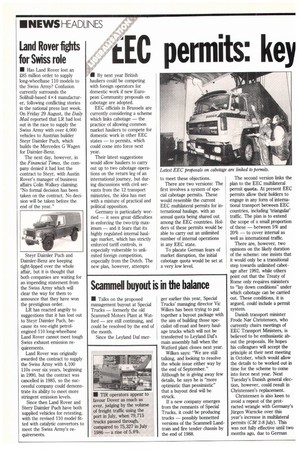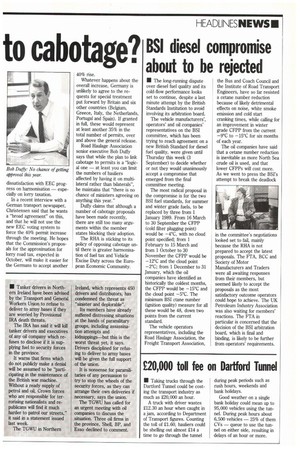iEC permits: key
Page 6

Page 7

If you've noticed an error in this article please click here to report it so we can fix it.
to cabotage?
• By next year British hauliers could be competing with foreign operators for domestic work if new European Community proposals on cabotage are adopted.
EEC officials in Brussels are currently considering a scheme which links cabotage — the practice of allowing common market hauliers to compete for domestic work in other EEC states — to permits, which could come into force next year.
Their latest suggestions would allow hauliers to carry out up to two cabotage operations on the return leg of an international journey, but during discussions with civil servants from the 12 transport ministries, the idea has met with a mixture of practical and political opposition.
Germany is particularly worried — it sees great difficulties in enforcing the two-trip maximum — and it fears that its highly regulated internal haulage market, which has strictly enforced tariff controls, is especially vulnerable to unlimited foreign competition, especially from the Dutch. The new plan, however, attempts to meet these objections.
There are two versions: The first involves a system of special cabotage permits. These would resemble the current EEC multilateral permits for international haulage, with an annual quota being shared out among the EEC countries. Holders of these permits would be able to carry out an unlimited number of internal operations in any EEC state.
To placate German fears of market disruption, the initial cabotage quota would be set at a very low level. The second version links the plan to the EEC multilateral permit quota. At present EEC permits allow their holders to engage in any form of international transport between EEC countries, including 'triangular' traffic. The plan is to extend the scope of a small proportion of these — between 5% and 20% — to cover internal as well as international traffic.
There are, however, two opinions on the likely duration of the scheme: one insists that it would only be a transitional step towards unlimited cabotage after 1992, while others point out that the Treaty of Rome only requires ministers to "lay down conditions" under which cabotage can be carried out. These conditions, it is argued, could include a permit system.
Danish transport minister Frode Nor Christensen, who currently chairs meetings of EEC Transport Ministers, is believed to be enthusiastic about the proposals. He hopes his colleagues will accept the principle at their next meeting in October, which would allow the details to be worked out in time for the scheme to come into force next year. Next Tuesday's Danish general election, however, could result in Christensen's replacement.
Christensen is also keen to avoid a repeat of the protracted wrangle with Germany's Jurgen Wanicke over this year's increase in multilateral permits (CM 2-8 July). This was not fully effective until two months ago, due to German dissatisfaction with EEC progress on harmonisation — especially on lorry taxation.
In a recent interview with a German transport newspaper, Christensen said that he wants a "broad agreement" on this, and that he will not use the new EEC voting system to force the 40% permit increase through the meeting. He hopes that the Commission's proposals for the approximation for lorry road tax, expected in October, will make it easier for the Germans to accept another 40% rise.
Whatever happens about the overall increase, Germany is unlikely to agree to the requests for special treatment put forward by Britain and six other countries (Belgium, Greece, Italy, the Netherlands, Portugal and Spain). If granted in full, these would represent at least another 35% in the total number of permits, over and above the general release.
Road Haulage Association senior executive Bob Duffy says that while the plan to link cabotage to permits is a "logical one — at least you can limit the numbers of hauliers affected by having it on multilateral rather than bilaterals", he maintains that "there is no chance of ministers agreeing on anything this year."
Duffy claims that although a number of cabotage proposals have been made recently, there are still too many arguments within the member states blocking their adoption.
The RHA is sticking to its policy of opposing cabotage until there is greater harmonisation of fuel tax and Vehicle Excise Duty across the European Economic Community.




























































































